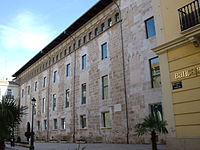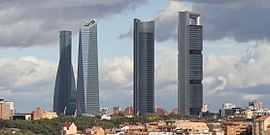Alikianos
Alikianos
Αλικιανός (Piraean) | |
|---|---|
From top down, left to right: skyline of Apostolou Boulevard, change of guards in Piraean Senate, Frederica von Elbenweis Monument, night view of the Acropolis walls, street view of Nikolaos II Square and general view of the Acropolis of Alikianos. | |
| Country | Piraea |
| Region | Souda Riviera |
| Government | |
| • Body | City Council of Alikianos |
| • Mayor | Melina Martou (LK) |
| Area | |
| • Total | 1,516 km2 (585 sq mi) |
| Population (2015) | |
| • Total | 1,380,508 |
| • Density | 910/km2 (2,400/sq mi) |
| HDI (2018) | 0.919 |
| Website | cityalk |
Alikianos (Pireás: Αλικιανός , tr. Alikianós) is the capital and most populous city of Piraea. Its metropolitan area has approximately 1,380,508 inhabitants, which make it a regionally important financial, cultural and political centre for South Euclea.
The area of Alikianos has counted with a crucial importance since at least the classical period, where the ancient Lasithi was built becoming a centre for the politics, philosophy, knowledge and democracy of Euclea. With the passing years, Lasithi was expanded, destroyed and rebuilt several times, until the Junktas volcano erupted, leaving the settlement in ashes. Through the following centuries, the nearby Alikianos was built but lagged behind other Piraese cities. During the 18th centuries, Alikianos became the centre of the Grand Duchy of Alikianos, the predecessor of the Kingdom of Piraea. It was going to be in 1835, during a period of recovering Piraese identity, that Alikianos was named capital of Piraea, increasing the city's importance as a commercial port and igniting a series of urban reforms that gave a distinct character to the city and positioned it as the epicentre of the Industrial Revolution in Piraea. Major urban renovations happened after the Great War; the rural exodus during the 60s and 70s consolidated Alikianos as the capital and most important city of Piraea.
The city is subdivided between a number of districts, which are administered by a locally elected junta. These districts are further divided into neighbourhoods. The government and administration of the municipality of Alikianos is centred in a plenary (Alikianos City Council), composed by 33 elected members from different political parties, and the mayor and their cabinet. The city council operates under a form parliamentary system, with similar structure as the Piraean Senate. Since the municipal elections of 2019, the mayor is Melina Martou, from the People's Party.
The city is home to the Anastas Palace and Piraean Senate, as well as other institutions and gubernamental offices of high importance. Alikianos is often considered an economically important city in the South of Euclea due to its booming services industry, highlighting tourism, media and finances. Most major Piraean companies are headquartered in the metropolitan area of Alikianos, and the city is regionally renowed due to its artistic scene with numerous important museums.
History
Ancient Lasithi
Middle Ages
Capital of the Kingdom
Modernisation and Industrial Revolution
Military rule
Recent history
Geography
Water supply
Government
 |
|
Government (23) People's Party (10) +Alk (8) Democrats (5) Opposition (10) Piraese Socialist Workers Union (6) Popular Unity Candidacy (3) Homeland Party (1) |






